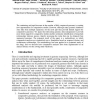Free Online Productivity Tools
i2Speak
i2Symbol
i2OCR
iTex2Img
iWeb2Print
iWeb2Shot
i2Type
iPdf2Split
iPdf2Merge
i2Bopomofo
i2Arabic
i2Style
i2Image
i2PDF
iLatex2Rtf
Sci2ools
112
click to vote
JIB
2007
2007
A Methodology for Comparative Functional Genomics
The continuing and rapid increase in the number of fully sequenced genomes is creating new opportunities for comparative studies. However, although many genomic databases store data from multiple organisms, for the most part they provide limited support for comparative genomics. We argue that refocusing genomic data management to provide more direct support for comparative studies enables systematic identification of important relationships between species, thereby increasing the value that can be obtained from sequenced genomes. The principal result of the paper is a methodology, in which comparative analyses are constructed over a foundation based on sequence clusters and evolutionary relationships. This methodology has been applied in a systematic study of the fungi, and we describe how comparative analyses have been implemented as an analysis library over the e-Fungi data warehouse.
Related Content
| Added | 15 Dec 2010 |
| Updated | 15 Dec 2010 |
| Type | Journal |
| Year | 2007 |
| Where | JIB |
| Authors | Intikhab Alam, Mike Cornell, Darren M. Soanes, Cornelia Hedeler, Han Min Wong, Magnus Rattray, Simon J. Hubbard, Nicholas J. Talbot, Stephen G. Oliver, Norman W. Paton |
Comments (0)

